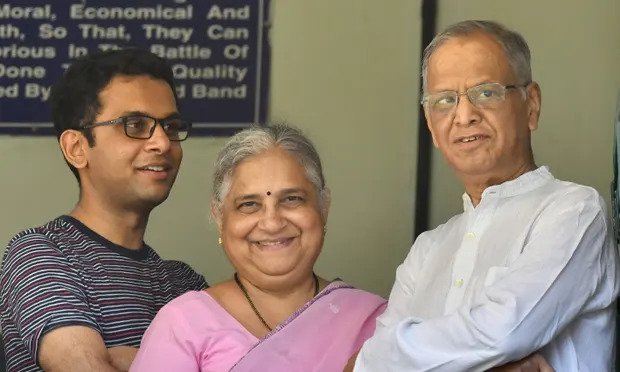Rishi Sunak’s father-in-law, the billionaire who does the dishes
By Amrit Dhillon
NEW DELHI -He may be worth £3.9bn but Rishi Sunak’s father-in-law, NR Narayana Murthy, lives in the same Bengaluru flat with his wife, Sudha, that he did decades ago, drives a small car, clears up the dishes, and cleans his own toilet.
Murthy is famous in India for co-founding in 1981 the software firm Infosys, now a £9.6bn multinational that employs more than 345,000 people.
The only difference from when he and Sudha were an unknown, ordinary couple is that the flat is filled to the rafters with books.
There is no glitz in their life, no haute couture, no lavish holidays or private jets, no swanky homes, no luxury brands. Everything about them is low-key and subdued. Murthy is an introvert who likes nothing more than to read.
In Sudha’s 2017 book, Three Thousand Stitches, she related how her husband cleans his own toilet, a job many Indians usually leave to employees of a lower caste, and also washes his own plate after meals.
Employees at Infosys have spoken of his belief in the dignity of labour and have seen Murthy fixing small electrical problems in the canteen himself. He is renowned for his integrity and says he has never given a bribe.
After books, philanthropy is another passion. “The real power of money is in giving it away,” is one of his famous sayings.
Murthy and six engineer friends founded Infosys after sitting in his flat debating how they could create a company to write software codes. They had no computer and had to borrow 10,000 rupees (£100) from Sudha to start the company, using the front room of the Murthy home as its office.
Infosys grew over four decades to offer software infrastructure, consulting, technology and outsourcing services, and received a big boost in the 2000s when US companies began shifting software development and back-office work to India because it was cheaper. Infosys’ revenues grew tenfold from 1999 to 2004, reaching $1bn. Today it is valued at $11bn.
Before Murthy retired as chair of the board in 2011, his punctuality was apparently as obsessive as Immanuel Kant’s, whose schedule was so precise that German housewives set their clocks based on his daily walks.
“I would be in the office at 6.20 every morning till I retired. That sent an indelible message to youngsters about reaching the office on time,” Murthy said in an interview with the Economic Times in July.
The Murthys, both in their late 70s, are viewed as a classic middle-class south Indian couple, implying simplicity in food, clothes and furnishings, living by strong family values, stressing education and hard work, honesty and mild behaviour. Landlords in Delhi to this day often state ‘south Indians preferred’ in ads when letting flats, owing to this reputation.
During the early years of Infosys when money was short, Murthy travelled economy class even on international flights. He stopped doing so only when the company reached a revenue of $1bn.
“He was an inspirational, outstanding role model,” said Suhel Seth, a marketing guru and managing partner of Counselage, who knows Murthy. “He was unique in showing the average middle-class Indian that you can succeed while being ethical at the same time. He is the epitome of the self-made man and his humility is genuine.”
Murthy retired on turning 65 in 2011, in compliance with the company’s policy, but the board prevailed on him to return in 2013 to revive its sagging fortunes. It was during this year, as executive chairman, that he brought his son, Rohan, who has a PhD from Harvard, into Infosys.
For the first time, Murthy attracted criticism. Bringing in his son went against the company’s longstanding principle, upheld by Murthy himself, of not hiring any relative, especially children, to avoid nepotism.
“Appointing Rohan is nepotism … It is surprising that the executive chairman found it important to groom his son rather than groom young leaders,” said Shriram Subramanian, a former Infosys employee, at the time.
When Murthy retired again a year later in 2014, Rohan also left. “To be fair to him, he understood why it did not feel right – even though the board had wanted Rohan because he is brilliant – and Rohan left,” said Seth.
Murthy tends not to speak on matters of the day. One rare intervention was when he criticized India’s harsh lockdown in 2020, saying it would kill more people than Covid.
The Murthys are bound to face more attention than before, given their powerful son-in-law, but friends say they are unlikely to become media-friendly or let his fame disturb their peaceful retirement.
-This article was originally featured on theguardian.com



Comments are closed, but trackbacks and pingbacks are open.